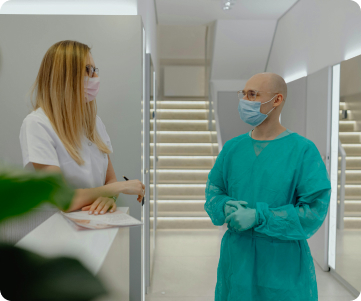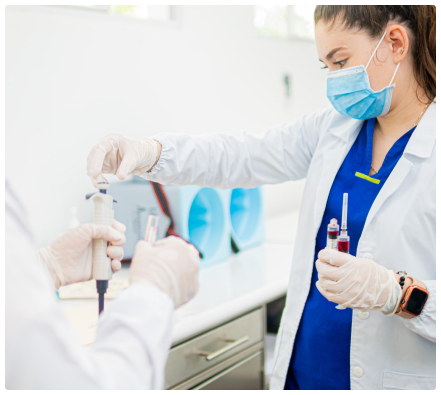 Program Length
Program Length
16 Weeks
 Prepares for
Prepares for
CCMA by NHA
 Avg. Starting Salary
Avg. Starting Salary
$42,000
 Issuing Authority
Issuing Authority

Get Started
Become a Medical Assistant in 16 Weeks
Our online program equips you with the essential skills and knowledge to thrive in hospitals, physician’s offices, and clinics across the country. In contrast to traditional degree programs, our streamlined curriculum focuses on hands-on learning and real-world applications, preparing you for entry-level positions in healthcare.
Learn at your own pace through interactive online lessons and virtual simulations, guided by experienced instructors who are active professionals in the medical field. Whether you’re helping with patient care, handling administrative tasks, or supporting medical teams, this program gives you the flexibility to learn and work toward a fulfilling career as a medical assistant.
Upon completion, you’ll be ready to take the national CCMA certification exam and step confidently into a vital role within the healthcare industry.
Learn how to:
- Take vital signs, including blood pressure
- Assist healthcare providers during exams and procedures
- Manage patient appointment scheduling
- Document patient history in electronic medical record (EMR) systems
- Prepare samples for lab testing
What Does the Medical Assistant Program Include?

Eligibility Requirements
- High School Diploma or GED
- Web browser with internet connection
- Course registration and payment

Cost & Included Materials
$2,500
- Self-Paced Online Program
- eBooks: HTA’s Medical Assistant E-Book

Student Services
- Regular check-ins with Student Services
- 6-month post-program access to career coaches
Disclaimer
We are committed to guiding you every step of the way including the completion of the clinical requirements. However, please note that the responsibility to complete these requirements lies with you. We recommend researching for job posts and state requirements to ensure a seamless transition into the workforce upon graduation.
What Will I Learn in a Medical Assistant Program?
Our medical assistant bootcamp combines self-paced online learning and on-the-job training to prepare you to land a job in a matter of weeks. You’ll develop skills in anatomy, pharmacology, clinical procedures, and medical law.
-
Course 1General Orientation
Get an overview of the medical assistant profession and its role within healthcare settings. This module will introduce key responsibilities, ethical practices, and expectations in the medical field.
- Learn the essential duties and responsibilities of a medical assistant.
- Understand the importance of professionalism, ethics, and patient confidentiality in healthcare.
- Explore the various healthcare settings where medical assistants work, including clinics, hospitals, and private practices.
-
Course 2Anatomy and Physiology
Gain a foundational understanding of the human body's structure and function. This module will cover the major systems and their roles in maintaining health.
- Learn the basic structure and function of the human body’s systems, including the circulatory, respiratory, and digestive systems.
- Understand how different body systems interact to maintain overall health and homeostasis.
- Explore common diseases and conditions associated with each body system and their impact on patient care.
-
Course 3Medical Terminology
Master the essential medical vocabulary used in healthcare to effectively communicate with patients and medical teams. This module will help you understand the building blocks of medical terms and their meanings.
- Learn the prefixes, suffixes, and root words commonly used in medical terminology.
- Understand how to break down complex medical terms for easier interpretation and communication.
- Explore common medical terms related to body systems, diseases, and procedures.
-
Course 4Medical Law and Ethics
Explore the legal and ethical principles that guide medical practice and protect patient rights. This module will cover key topics such as confidentiality, consent, and professional conduct in healthcare settings.
- Learn the foundational laws and regulations that govern healthcare practice, including HIPAA and patient rights.
- Understand the ethical responsibilities of medical assistants, including issues of confidentiality and informed consent.
- Explore common ethical dilemmas in healthcare and how to handle them professionally.
-
Course 5Human Relations
Develop effective communication skills to build strong relationships with patients, families, and healthcare teams. This module focuses on understanding diverse patient needs and fostering a compassionate, respectful environment.
- Learn communication techniques for interacting with patients and colleagues in a professional and empathetic manner.
- Understand the importance of cultural sensitivity and how to provide care to diverse populations.
- Explore conflict resolution strategies and how to manage difficult situations in a healthcare setting.
-
Course 6Pharmacology
Gain a comprehensive understanding of medications, their uses, and how they affect the body. This module will cover drug classifications, dosage calculations, and safe medication administration.
- Learn the different classes of medications and their therapeutic effects.
- Understand how to calculate drug dosages and ensure accurate medication administration.
- Explore common drug interactions, side effects, and patient safety precautions.
-
Course 7Administrative Processes
Learn the essential administrative skills needed to manage the front office of a healthcare facility. This module will cover tasks such as scheduling, patient intake, and managing medical records.
- Learn how to effectively schedule patient appointments and manage office calendars.
- Understand the importance of accurate patient documentation and maintaining electronic health records (EHR).
- Explore billing and coding practices, including insurance verification and processing payments.
-
Course 8Clinical Procedures
Master the hands-on clinical skills required to assist in patient care and support healthcare providers. This module will cover common clinical tasks, from taking vital signs to performing basic lab tests.
- Learn how to take and record vital signs, including blood pressure, temperature, and pulse.
- Understand how to assist in routine clinical procedures, such as injections, wound care, and specimen collection.
- Explore the proper use of medical instruments and equipment for patient care and diagnostic tests.
-
Course 9Medical Laboratory Procedures
Develop the skills to assist in basic laboratory tests and understand the role of laboratory procedures in patient diagnosis. This module will cover the preparation and handling of lab specimens and common diagnostic tests.
- Learn how to properly collect, label, and handle lab specimens for testing.
- Understand common laboratory tests, such as blood work, urinalysis, and microbiology cultures.
- Explore the importance of accuracy in lab procedures and how to ensure proper infection control.
-
Course 10Career Development
Prepare for a successful career as a medical assistant by developing job-search strategies, interview skills, and professional growth techniques. This module will guide you through the process of launching your career and advancing in the healthcare field.
- Learn how to create an effective resume and cover letter tailored to medical assistant roles.
- Understand interview techniques and how to present yourself professionally to potential employers.
- Explore strategies for continuing education and career advancement within the healthcare industry.
Download the Medical Assistant syllabus to view all courses and requirements.
Student Support Resources
Explore further learning assets, clinical resources, and post-graduation job placement opportunities.
Enhance your Medical Assistant education with these valuable resources designed to support your learning journey and career development.
- Welcome Kits: Get started on the right foot with essential program information and resources conveniently compiled in one place.
- One-on-One Coaching: Receive personalized guidance and support from experienced professionals to address your individual learning needs.
- Online Learning Platform: Access course materials, assignments, and interactive learning tools anytime, anywhere.
- eBooks: Deepen your understanding of key concepts with comprehensive digital textbooks covering essential surgical technology topics.
- Procedure Videos: Visualize and learn surgical techniques through detailed video demonstrations of various procedures.
- Medical Assistant Skills Checklist Monitor your progress and ensure you've mastered all essential skills with this easy-to-use checklist.
Launch your Medical Assistant career with these dedicated job placement resources designed to help you secure a fulfilling position.
- Soft Skills Development: Enhance your communication, teamwork, and interpersonal skills, crucial for success in the operating room environment.
- Resume Building: Craft a compelling resume that highlights your skills and experience, making you a standout candidate for Medical Assistant positions.
- Interview Preparation: Prepare for job interviews with practice sessions and expert guidance, boosting your confidence and performance.
- LinkedIn Optimization: Create a professional LinkedIn profile to network with potential employers and showcase your qualifications to a wider audience.
- Professional Profile Construction: Develop a comprehensive professional profile that effectively communicates your skills and career goals to prospective employers.
- Employability Training: Gain valuable job search strategies and career development skills to navigate the job market successfully and secure your ideal Medical Assistant role.
Bridge the gap between education and employment with these clinical and externship resources designed to facilitate your transition into a professional Medical Assistant role.
- Externship Guidance: Receive support and guidance in finding and securing a valuable externship experience to gain practical skills in a real-world setting.
- Job Board Assistance: Access curated job boards and resources to discover current Medical Assistant openings and connect with potential employers.
- Employer Referrals: Benefit from our network of industry connections and receive referrals to employers seeking qualified Medical Assistant.
- Potential Employer Communication Assets: Utilize professionally designed templates and resources to effectively communicate with potential employers and make a strong impression.
Where Will I Work as a Medical Assistant?
Once certified, medical assistants become eligible to work in a variety of allied health settings. Health Tech Academy’s bootcamp prepares you to work in physician offices, hospitals, outpatient care centers, and other healthcare facilities.

Physician Offices and Medical Clinics
see more
Physician Offices and Medical Clinics
Medical assistants working in physician’s offices assist doctors and nurses with scheduling patient appointments, collecting patient information, and recording vital signs. More than half of all medical assistants work in this setting.
Average Annual Salary: $40,670

Hospitals
see more
Hospitals
For individuals who thrive in high pressure situations or require schedule flexibility, working in a hospital may be the right fit. Medical assistants working in hospitals will often perform both clinical and administrative tasks, including urgent patient care.
Average Annual Salary: $$44,350

Outpatient Care Centers
see more
Outpatient Care Centers
Medical assistants in outpatient care centers may assist with minor surgeries and procedures, perform lab tests, or provide mental health care depending on the facility.
Average Annual Salary: $46,090

Other Healthcare Facilities
see more
Other Healthcare Facilities
Medical assistants are also needed in a variety of healthcare settings, including pediatrics, OB-GYN, chiropractic, diagnostic laboratories, and clinical research. These roles may require additional training or certification and may include either clinic or administrative tasks or both.
Average Annual Salary: $36,480
Free Career Assessment
Is Medical Assistant the right healthcare career for you? Take our quick allied health career assessment to determine which role is the best for your skills, experience, and aspirations.
*All salaries according to 2025 estimates released by the U.S. Bureau of Labor Statistics.
Health Tech Academy Tuition Advantage
Unlock your future in healthcare technology with flexible payment options including full payments, installment plans, and Study Now, Pay Later plans.
$190/MONTH
Deposit $190 today to enroll and pay $190 monthly for 12 months. Zero-interest, No credit checks!
- All Materials Included
- Customizable Payments
- Student Services Check-ins
- Certificate of Completion
- No Additional Fee
- No Interest
- Career Advising Sessions
- Official Transcript
- All Materials Included
- Career Coaching Sessions
- Exam Voucher
- Student Services Check-ins
- Certificate of Completion
- No Additional Fee
- Career Advising Sessions
- Official Transcript
- All Materials Included
- Student Services Check-ins
- Certificate of Completion
- No Additional Fee
- Career Advising Sessions
- Official Transcript
Payment Options
Clinical Medical Assistant Program Comparisons
| Community College | Online Colleges | ||
|---|---|---|---|
| Program & Tuition Cost | $1,250$2,700 |
$2,000 to $10,000/year | $3,000 to $10,000/year |
| Books, Materials & Fees | Included | + $500 to $2,000 | + $500 to $2,000 |
| Job Ready Timeline | 4-6 months | 1 to 2 years | 6 months to 2 years |
| 100% Online | |||
| Schedule Flexibility | |||
| Job Placement Assistance | |||
| Clear Path to Certification | |||
| No Travel Requirements |
Gain the knowledge and skills you need for a job in medical assistance – and the confidence to transform your career.
Schedule a call with one of our admissions advisors to get started right now.
Schedule a CallMedical Assistant Certification Program FAQs
Reference common questions, and answers, about our medical assistant program.
What is a Medical Assistant Program?
How do I get a Medical Assistant Certification?
What is the CCMA by NHA certification?
How long is the Medical Assistant Bootcamp?
How much does a Medical Assistant Program cost?
We also offer customized payment plans to accommodate individual budgets, making our program accessible to a wider range of aspiring medical assistants.
Does Health Tech Academy offer a refund policy on its Medical Assistant Bootcamp?
Does HTA guarantee the externship or job placement?
What does a Medical Assistant do?
What skills does a Medical Assistant need?
How much does a Medical Assistant make?
Do I need healthcare experience to start the Medical Assistant Bootcamp?
GET JOB READY
A Faster Path to a Meaningful Career in Healthcare
HealthTech Academy is designed to accelerate your path to a well-paying healthcare career, on your schedule. From selecting the right program to career mentorship, our team is here to help you succeed.
Schedule a Call















